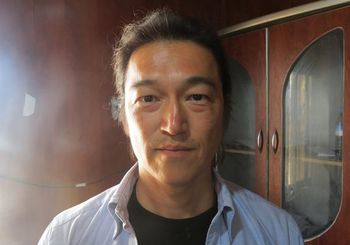
Kenji Goto, the 47-year-old television journalist held captive by the Islamic State (IS), is not a typical reporter, nor is he typically Japanese. But his courage and commitment to broadcasting humane stories from some of the world's most dangerous conflict zones would put him at the pinnacle of his profession anywhere in the world. It was such courage that took him to Syria last year, where he was taken hostage.
After the tragic murder last week of his fellow hostage and friend, Haruna Yukawa, the militant group released a statement conditioning his release on a swap with a woman imprisoned in Jordan after a failed suicide bombing. Today, IS released a video with a voiceover said to be Goto's, which claims he has 24 hours left to live unless his captors' demands are met. Whatever the outcome, Goto's capture is an outrage.
I met Goto in 2010 when I was bureau chief for The Economist in Tokyo. He was an occasional neighbor, when he wasn't visiting trouble spots in the Middle East. He is a much-loved father, who has three children. It is hard to reconcile the soft-spoken, gentle man, who once paled in a bowling alley because the sound of the balls reminded him of bombs dropping on Iraq, with the image of a hardened war correspondent. But he covers wars with a difference. Instead of focusing on who is winning or losing, he tells the stories of ordinary people, especially children, who are forced to endure conflict and the horrors surrounding them. It is their resilience that inspires him, he says. When you ask how he reaches the dangerous places he reports from, he says he follows the footsteps of normal people getting on with their lives. They show him the way.
Since founding his news agency, Independent Press, in 1996, he has covered conflict in Chechnya, Albania, Kosovo, Sierra Leone, Liberia, Afghanistan, Iraq, and Syria, among other places. As a freelancer, he funds many of these trips himself. In Japan, there is an almost tribal loyalty between TV networks and their staff, but Goto has won the respect of the networks by visiting places they are reluctant to send their correspondents to. His documentaries regularly air on NHK, Japan's national network, TV Asahi and others. But he would insist on taking responsibility for his own safety so they would not be blamed if he came to any harm. His friends think that was the point of his last video, recorded on October 25, before his kidnap, in which he said he took full responsibility for his actions.
Goto has experienced the full horror of war. In Liberia, friends recall, he talked about seeing hundreds of bodies being bulldozed into a grave the size of a swimming pool. In Iraq, he said a soldier put a gun to his head. But he has sought to draw out lessons from his reporting that are uplifting, especially for children. His DVD and book, Welcome to Our School, brought out by NHK in 2003, featured children in countries including Iraq and Afghanistan introducing their schools, even those closed by conflict, and talking about their love of learning. He has also written books about AIDS, child soldiers in Sierra Leone, genocide in Rwanda, and schoolgirls in Afghanistan. On visits to schools, he has told children in Japan how privileged they are that school is such a "normal" part of life.
On Japanese television he has brought the outside world to children with little knowledge of it. Akira Ikegami, a TV anchor, recalls hosting Goto on a NHK family news program where he tried so hard to project the pain of youngsters living in war-torn regions of the Middle East that it had a moving impact on the viewers. "He is a warm-hearted guy who has a sense of duty in his reporting," Ikegami told me via email. Ikegami added that most Japanese tend to regard conflict in far-flung places as alien. But with his humanitarian approach, Goto has stirred up interest and inspired some to start voluntary work on behalf of refugees.
In Japan, the popular pressure to free him is growing, after a hesitant start in which some attacked him on social media for being in Syria in the first place. An #IamKenji campaign on Facebook and Twitter has mushroomed. There had been growing hope he would be freed alongside Muath al-Kasabeh, the Jordanian fighter pilot also held by IS. However the latest video, if authentic, suggests Goto and the pilot remain in grave danger. A brave journalist who is a voice of humanity in the midst of atrocity is in the midst of a tragic hostage situation. He should be freed.

